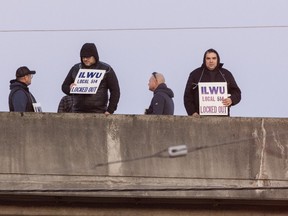Breaking News
A major labour dispute has brought trade to a halt at Canada’s busiest and third-busiest ports in British Columbia. The lockout, which began on Monday, affects an estimated $800 million per day in freight activity, including containers, automobiles, forestry, steel, and fertilizer.
Lockout Imposed by BC Marine Employers Association
The BC Marine Employers Association (BCMEA) announced that it had made the "difficult decision to lock out forepersons" and other union members as of 4:30 p.m. Pacific time on Monday. The move comes after a 72-hour advance notice from the International Longshore and Warehouse Union Ship & Dock Foremen Local 514, which represents about 730 workers at ports including Vancouver and Prince Rupert.
Impact on Trade
A spokesperson for the Vancouver Fraser Port Authority confirmed that a large array of freight activity has been shut down or will be affected by the lockout. The organization is working closely with industry to keep goods moving where possible, but the impact is expected to be significant.
"Containers, automobiles, forestry, steel, and fertilizer are among the commodities that will be affected," said the spokesperson. "We understand the importance of keeping trade flowing, and we’re doing our best to mitigate the disruption."
Previous Labour Disputes
The lockout comes after a 13-day strike by more than 7,000 longshore workers caused large-scale disruption at Canada’s west coast ports last year. The North American transportation and logistics sectors have continued to be hit by labour disputes this year.
In Montreal, Canada’s No. 2 port has seen intermittent stoppages in recent weeks due to an issue with a separate dockworker union. The Canadian government estimated that the 2023 British Columbia port strike reduced Canada’s gross domestic product by between $730 million and $980 million, affecting shipments worth $10 billion.
Why the Lockout?
The BCMEA cited the need for a safe and orderly wind-down of operations as the reason for imposing the lockout. The employer association expressed concern that strikes can escalate without notice, making it necessary to take proactive measures to maintain a safe working environment.
"The union’s 72-hour advance notice gave us sufficient time to prepare for the potential disruption," said a spokesperson for the BCMEA. "However, we cannot predict when or if the strike will escalate, so we’ve taken steps to lock out forepersons and other union members until further notice."
What’s Next?
The lockout is expected to continue until a resolution is reached between the union and the employer association. The Greater Vancouver Board of Trade has estimated that the disruption could last for several days or even weeks, depending on the outcome of negotiations.
The labour dispute highlights the ongoing challenges facing Canada’s transportation and logistics sectors. As trade continues to grow, it’s essential to address the root causes of these disputes and work towards a more stable and efficient supply chain.
Key Statistics:
- Estimated $800 million per day in freight activity affected by lockout
- 730 workers represented by International Longshore and Warehouse Union Ship & Dock Foremen Local 514
- Lockout imposed by BC Marine Employers Association as of 4:30 p.m. Pacific time on Monday
- Previous labour disputes have caused significant disruption to trade at Canada’s west coast ports
Recommended Reading:
- "B.C. port employers to launch lockout at terminals"
- "Port strikes in Montreal and eastern U.S. will ripple widely"
Stay up-to-date with the latest news and developments on this story by following our coverage. Share your thoughts and join the conversation in the comments below.
Comments
You must be logged in to join the discussion or read more comments. Create an account or sign in to participate.
Join the Conversation:
- Follow us on social media for breaking news and updates
- Share this article with your network to spread awareness about the lockout
- Join the discussion in the comments below to share your thoughts and opinions

